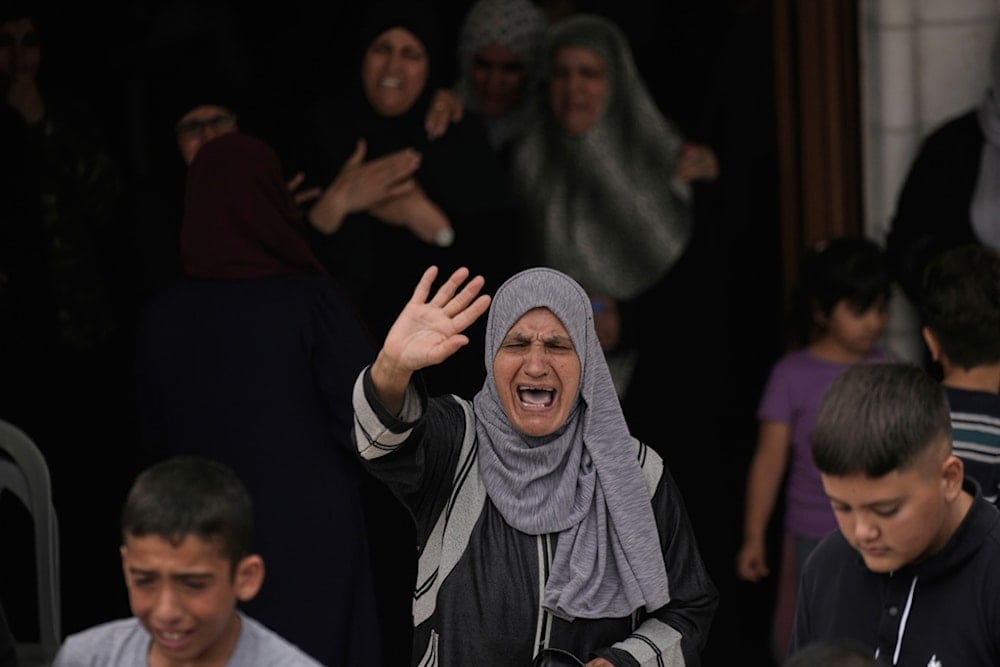'Israel' escalates arrests in al-Quds, targets children, al-Aqsa
"Israel" arrested over 60 Palestinians in Al-Quds in July, including children and women, amid growing repression and bans on al-Aqsa defenders and worshippers.
-

A woman bids farewell to the Palestinian American Khamis Ayyad, 40, who died while trying to extinguish a fire during an Israeli settlers attack, at his funeral in the West Bank village of Silwad, near Ramallah, Friday, August 1, 2025 (AP)
Israeli occupation forces intensified their repressive campaigns across occupied al-Quds throughout July, arresting more than 60 Palestinian residents, including eight children and two women, in a systematic effort to entrench security control over the city.
According to local monitoring groups, Israeli occupation courts issued 11 administrative detention orders and handed down 18 actual prison sentences last month. Notably, two young men, Anas Abu Zneid and Ashham al-Umleh, were sentenced to 10 years in prison, while 17-year-old Abdullah Abu Diab received a four-year sentence.
The Israeli regime also imposed three house arrest orders and nine deportation decisions, including seven that banned individuals from entering al-Aqsa Mosque. Among those targeted were the Grand Mufti of Al-Quds and several mosque guards, part of a broader effort to suppress religious presence and popular solidarity in the holy site.
In a continued crackdown on defenders of Islamic holy sites, Israeli authorities renewed travel bans against prominent Palestinian activists Hanadi Halawani and Khadija Khwais. Both women are known for their steadfast presence in Al-Aqsa Mosque and have long been targeted under the occupation’s policy of collective punishment.
Since the beginning of the Israeli aggression on the occupied West Bank, including al-Quds, the total number of documented arrests has exceeded 18,000, according to the Palestinian Commission of Detainees and Ex-Detainees Affairs and the Palestinian Prisoners’ Club.
Intensified military raids in West Bank
The Israeli occupation has intensified its military raids and detention campaigns across the occupied West Bank, arresting at least 30 Palestinians between Monday night and Tuesday. The arrests are part of a broader policy of collective punishment and systematic retaliation against Palestinian civilians.
According to the Palestinian Prisoners’ Club and the Detainees and Ex-Detainees Affairs Commission, the latest campaign targeted several areas, with a focus on al-Fawwar refugee camp in the al-Khalil governorate. Additional arrests and field interrogations were carried out across Ramallah, Beit Lahm, Nablus, Tubas, Salfit, Tulkarm, and Qalqilya.
Among those detained were three recently released prisoners from Qalqilya: Samih al-Shubaki, Saed al-Fayed, and Saeed Diab, all of whom had been freed earlier this year as part of a ceasefire deal. Their re-arrest, the two organizations stressed, is a clear violation of the agreement and reflects a deliberate Israeli policy of targeting freed detainees.
Mass arrests top 18,000 since start of West Bank aggression
The latest wave brings the total number of arrests in the West Bank, including occupied al-Quds, to over 18,000 since the beginning of the current Israeli assault, not counting the thousands arrested in Gaza, many of whom were later released or remain missing.
The occupation forces continue to conduct nightly incursions, often accompanied by live fire, destruction of property, and the use of detainees as human shields. Palestinian families regularly report violent home invasions, physical abuse, and on-site interrogations.
In a related development, occupation troops stormed al-Khader, south of Beit Lahm, on Tuesday evening. They blocked the main road between the town and its gate, raided multiple homes belonging to the Salah family, and vandalized personal belongings. No arrests were reported during the raid.
Netanyahu, Smotrich seeking further annexation
Israeli far-right Finance Minister Bezalel Smotrich urged Prime Minister Benjamin Netanyahu on Monday to move forward with "annexing" the occupied West Bank, declaring there is "no more appropriate time" to apply full "Israeli sovereignty" over the territory.
Speaking before the Knesset Foreign Affairs and Defense Committee’s Subcommittee for Judea and Samaria, Smotrich framed the move as a "historic correction" to what he called the 2005 “mistake” of "Israel’s" unilateral withdrawal from Gaza’s Gush Katif settlement bloc. He emphasized the "annexation’s political, security, economic, and moral significance,” describing it as essential to the Zionist project.
“We’re advancing in two stages,” Smotrich explained. “First, de facto sovereignty, through administrative and cognitive processes, to normalize settlement. Second, internal institutional changes, so that when the formal act is carried out, the system will be ready. We’ve done the groundwork—legally and administratively. We’re ready to press the button.”
In a direct appeal to Netanyahu, Smotrich stressed, “We have full support from the US administration—I say this from knowledge. The sky will not fall.” He called on the prime minister to act decisively, invoking Jewish historical destiny and urging him to convene the government to approve annexation.

 5 Min Read
5 Min Read










